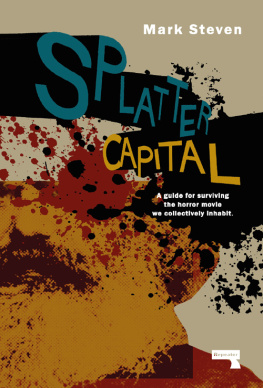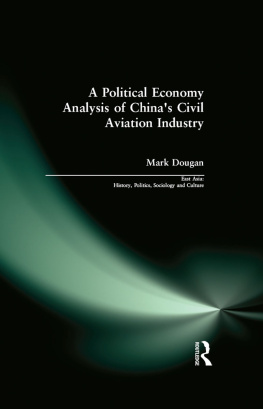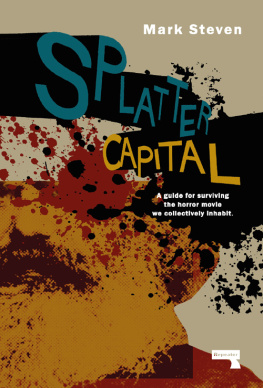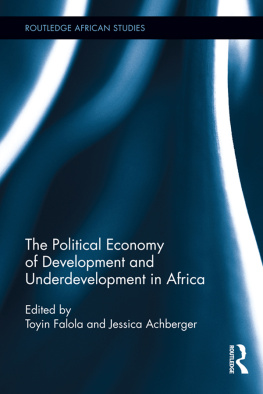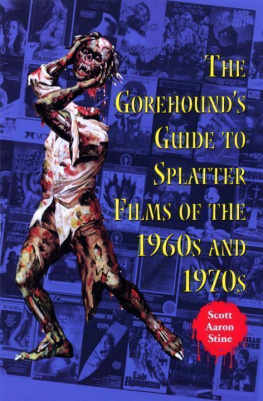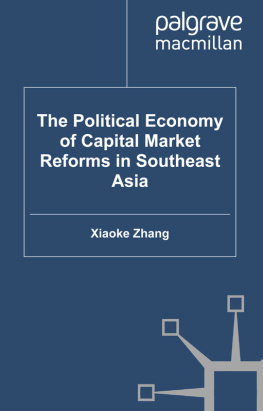Mark Steven - Splatter Capital. The Political Economy of Gore Films
Here you can read online Mark Steven - Splatter Capital. The Political Economy of Gore Films full text of the book (entire story) in english for free. Download pdf and epub, get meaning, cover and reviews about this ebook. City: London, year: 2017, publisher: Repeater, genre: Art. Description of the work, (preface) as well as reviews are available. Best literature library LitArk.com created for fans of good reading and offers a wide selection of genres:
Romance novel
Science fiction
Adventure
Detective
Science
History
Home and family
Prose
Art
Politics
Computer
Non-fiction
Religion
Business
Children
Humor
Choose a favorite category and find really read worthwhile books. Enjoy immersion in the world of imagination, feel the emotions of the characters or learn something new for yourself, make an fascinating discovery.
- Book:Splatter Capital. The Political Economy of Gore Films
- Author:
- Publisher:Repeater
- Genre:
- Year:2017
- City:London
- Rating:4 / 5
- Favourites:Add to favourites
- Your mark:
- 80
- 1
- 2
- 3
- 4
- 5
Splatter Capital. The Political Economy of Gore Films: summary, description and annotation
We offer to read an annotation, description, summary or preface (depends on what the author of the book "Splatter Capital. The Political Economy of Gore Films" wrote himself). If you haven't found the necessary information about the book — write in the comments, we will try to find it.
Mark Steven: author's other books
Who wrote Splatter Capital. The Political Economy of Gore Films? Find out the surname, the name of the author of the book and a list of all author's works by series.
Splatter Capital. The Political Economy of Gore Films — read online for free the complete book (whole text) full work
Below is the text of the book, divided by pages. System saving the place of the last page read, allows you to conveniently read the book "Splatter Capital. The Political Economy of Gore Films" online for free, without having to search again every time where you left off. Put a bookmark, and you can go to the page where you finished reading at any time.
Font size:
Interval:
Bookmark:
Splatter Capital:
The Political
Economy of
Gore Films
The Political
Economy of
Gore Films
Mark Steven

Published by Repeater Books
An imprint of Watkins Media Ltd
19-21 Cecil Court
London
WC2N 4EZ
UK
www.repeaterbooks.com
A Repeater Books paperback original 2017
Copyright Mark Steven 2017
Mark Steven asserts the moral right to be identified as
the author of this work.
Cover design: Johnny Bull
Typography and typesetting: Josse Pickard
Typefaces: Akko Rounded Pro/TheSerif
ISBN: 978-1910924-95-2
Ebook ISBN: 978-1-910924-86-0
All rights reserved. No part of this publication may be reproduced, stored in a retrieval system, or transmitted, in any form or by any means, electronic, mechanical, photocopying, recording or otherwise, without the prior permission of the publishers.
This book is sold subject to the condition that it shall not, by way of trade or otherwise, be lent, re-sold, hired out or otherwise circulated without the publishers prior consent in any form of binding or cover other than that in which it is published and without a similar condition including this condition being imposed on the subsequent purchaser.
This book and its author owe a debt of gratitude to numerous comrades scattered across the globe. My thinking about politics, economics, and cinematic horror has been shaped by ongoing and intermittent conversation sometimes combative, always enjoyable with Sam Dickson, Rory Dufficy, Grace Hellyer, Alexander Howard, Ruth Jennison, Angelos Koutsourakis, George Kouvaros, and Julian Murphet. Alex and Ruth both read drafts of the manuscript, and their suggestions improved it tenfold. The team at Repeater are on the right side of history. Thanks there to Mark Fisher for putting faith in this book when it was still an idea, Tariq Goddard who signed off on that idea and later provided editorial interventions, Josh Turner for the incisive copyediting, and Phoebe Colley for exterminating my numerous typos. The composition of this book coincided with the first year of my sons life, and many of the films discussed herein were watched and re-watched with him asleep on my chest. The existence of this book is therefore due in a very material sense to Finn Montague, who for so long refused to sleep on anything besides his parents and thereby ensured lengthy stretches of time with little else to do but sit and think before a glowing screen. A thousand thanks are due to Kate Montague, without whose intelligence, patience, and generosity this book would never have existed. Kate gives me reason to be. And, finally, this book is dedicated to my grandmother, Doreen Arahill, who not only allowed me to rent all sorts of horrific films when I was much too young to do so on my own, but who also watched them with me.
Table of Contents
The radical and mechanical separation of the concepts of violence and economics could only arise at all because the fetish of the pure objectivity of economic relations obscures the fact that they are really relations between men and so transforms them into a second nature which envelops man with its fatalistic laws.
Georg Lukcs
And then, above all, there is the new arrival the thinking that does not shy away from the horror of the world, the darkness, but looks it straight in the face, and thus passes over into a different kingdom, which is not the kingdom of darkness.
Henri Lefebvre
GOT ME A MOVIE AH HA HA HO
SLICIN UP EYEBALLS AH HA HA HO
The Pixies
A bizarrely sweaty and visibly troubled man stands before a red backdrop. He has that look about him. The one preceded by an unconscionable ordeal. Some would call it the thousand-yard-stare. He reads a memorandum in deadpan, all slow and shaky, without looking directly into the camera:
This picture, truly one of the most unusual ever filmed, contains scenes which under no circumstances should be viewed by anyone with a heart condition or anyone who is easily upset. We urgently recommend that if you are such a person or the parent of a young or impressionable child now in attendance that you and the child leave the auditorium.
These words are delivered as the epigraph to Michael Moores 2009 documentary about the global financial crisis, Capitalism: A Love Story. Their recitation gives way to Iggy Pops anthem for post-socialist, anti-capitalist discord, a swaggering rendition of Louie Louie, used here to soundtrack cctv footage of numerous bank stick-ups. The communist world is falling apart, drawls the aging rocker, the capitalists are just breaking hearts. Balaclavas, baseball bats, and backpacks full of cash. Despite its apparent irony, theres an irrepressible exuberance to this. Here bank robbery looks as fun as it is heroic. But is this, a gleeful pageant of armed insurrection, what those with heart conditions and the easily upset and young or impressionable children should avoid? No. Such an exhilarating assemblage of sound and image is not the picture against which this sweaty, troubledman had hoped to caution us.
The warning is lifted from archival footage. It originates in the coming attraction announcement for the first ever splatter film, Blood Feast, directed by Herschell Gordon Lewis and released in 1963. There and then it served as more of a come-on than a genuine caution, and in this capacity the two recitations are similar, but that is where the similarities appear to end. In its original iteration it challenged heedless cinemagoers to weather out a very different montage. What followed was a barrage of shots in which tongues and hearts and scalps and limbs are all amputated from their bodies without much in the way of narrative context. Nothing like a socially conscientious documentary, this was gratuitousness of a higher order, a bloody mess the likes of which had never before hit the celluloid. Its goal was to galvanize an audience through reverse psychology. We figured, Lewis would later reflect, if that didnt keep them in their seats nothing would.
I begin here not only to telegraph the variously grotesque and consistently gruesome films on which this book fixates consider this a half-facetious caution for the sensitive reader and a playful bait for the intrepid but also because the warnings recurrence after almost half a century intimates a potentially meaningful relationship between cinematic gore and economic crises. Between spectacles of mutilation on the one hand, and the determinations of a failing economy on the other. Between splatter and capitalism. That relationship is the focus of this book, the task for which is to show how a popular sub-genre of horror cinema lays claim to a uniquely critical perspective on our historical situation. Luridly, we have been told, the horror of the ending lights up the deception of the origin. That was the most stolid of all thinkers, Theodor Adorno, describing the function of serious art in 1951. But what he was saying then is doubly true of splatter now, one of the most lurid forms of art to occupy the dizzying onrush of a world-historic ending. That is to say, we have reached a moment in time when the seemingly invincible machinery of capitalist accumulation must once again rezone and reassemble, and yet such a process seems increasingly doubtful given the world-systems material limits. It is this imminentending, the fatal haemorrhage of capitalist value, to which splatter responds.
According to Siegfried Kracauer, writing in his psychological history of German cinema during the rise of Nazism, films address themselves, and appeal, to the anonymous multitude. Popular films or to be more precise, popular screen motifs can therefore be supposed to satisfy existing mass desires. Yes, of course they do, but what desire is being satisfied by splatter? My theory is this: splatter, with its screen motifs of violence and gore, knows that when capital inscribes itself into our bodies and when our bodies are hardwired into capital what we are experiencing is a protracted mutilation whose internal processes are both accelerated and destabilized in times of crisis. Splatter confirms and redoubles our very worst fears. It reminds us of what capital is doing to all of us, all of the time of how predators are consuming our life-substances; of how we are gravely vulnerable against the machinery of production and the matrices of exchange; and of how, as participants of an internecine conflict, our lives are always already precarious.
Next pageFont size:
Interval:
Bookmark:
Similar books «Splatter Capital. The Political Economy of Gore Films»
Look at similar books to Splatter Capital. The Political Economy of Gore Films. We have selected literature similar in name and meaning in the hope of providing readers with more options to find new, interesting, not yet read works.
Discussion, reviews of the book Splatter Capital. The Political Economy of Gore Films and just readers' own opinions. Leave your comments, write what you think about the work, its meaning or the main characters. Specify what exactly you liked and what you didn't like, and why you think so.

